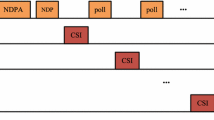Abstract
This paper proposes a random access based feedback protocol for multiuser orthogonal frequency division multiple access (OFDMA) systems with clustered feedback, where users are assigned to clusters of subcarriers based on the feedback of channel state information to the base station. To reduce feedback requirements, the proposed protocol employs a contention channel with a fixed number of feedback minislots to carry feedback for each cluster. Users send a feedback message with some probability in the appropriate feedback slot if their average channel quality on a cluster is above a threshold. Both arithmetic and geometric averages are used and compared as channel quality measures. The threshold and feedback probability are jointly adjusted to maximize the estimated average sum rate of all users based on two different limited feedback information. Numerical simulations illustrate that it is possible to achieve multiuser diversity gain despite collisions in the feedback channel and with only a few feedback opportunities.
Similar content being viewed by others
References
Knopp, R., & Humblet, P. (1995). Information capacity and power control in single-cell multiuser communications. In Proceedings of the International Conference on Communications (Vol. 1, pp. 331–335).
Andrews M., Kumaran K., Ramanan K., Stolyar A., Whiting P. and Vijayakumar R. (2001). Providing quality of service over a shared wireless link. IEEE Communications Magazine 39(2): 150–154
Viswanath P., Tse D.N.C. and Laroia R. (2002). Opportunistic beamforming using dumb antennas. IEEE Transactions on Information Theory 48(6): 1277–1294
Gesbert, D., & Slim-Alouini, M. (2004). How much feedback is multi-user diversity really worth? In Proceedings International Conference on Communications, June 2004 (pp. 234–238).
Johansson, M. (2003). Benefits of multiuser diversity with limited feedback. In Proceedings of IEEE Workshop on Signal Processing Advances in Wireless Communications, June 2003 (pp. 155–159).
Sanayei, S., Nosratinia, A., & Al-Dhahir, N. (2004). Opportunistic dynamic subchannel allocation in multiuser OFDM networks with limited feedback. In IEEE Information Theory Workshop, Oct. 2004 (pp. 182–186).
Tang T. and Heath Jr. R.W. (2005). Opportunistic feedback for downlink multiuser diversity. IEEE Communications Letters 9(10): 948–950
Qin X. and Berry R.A. (2006). Distributed approaches for exploiting multiuser diversity in wireless networks. IEEE Transactions on Information Theory 52(2): 392–413
Prasad, R. (2004). OFDM for wireless communications systems. Artech House Publishers.
Ekstrom H., Furuskar A., Karlsson J., Meyer M., Parkvall S., Torsner J. and Wahlqvist M. (2006). Technical solutions for the 3G long-term evolution. IEEE Communications Magazine 44(3): 38–45
Cimini, L. J., Daneshrad, B., & Sollenberger, N. R. (1996). Clustered OFDM with transmitter diversity and coding. In Proceedings Global Telecommunications Conference, Nov. 1996.
Wong C.Y., Cheng R.S., Lataief K.B. and Murch R.D. (1999). Multiuser OFDM with adaptive subcarrier, bit, and power allocation. IEEE Journal on Selected Areas in Communication 17(10): 1747–1758, Oct. 1999.
Svedman, P., Wilson, S. K., Cimini, Jr. L. J., & Ottersten, B. A simplified opportunistic feedback and scheduling scheme for OFDM. In Proceedings of Vehicular Technology Conference (Vol. 4, pp. 1878–1882), May 2004.
Tang, T., Heath Jr. R. W., Cho, S., & Yun, S., Opportunistic feedback in clustered OFDM systems. In Proceedings of International Symposium on Wireless Personal Multimedia Communications, Sept. 2006.
Park D., Seo H., Kwon H. and Lee B. G. (2005). Wireless packet scheduling based on the cumulative distribution function of user transmission rates. IEEE Transactions on Communications 53: 1919–1929
Tang T., Heath Jr. R.W., Cho S. and Yun S. (2007). Opportunistic feedback in multiuser MIMO systems with linear receivers. IEEE Transactions on Communications 55(5): 1020–1032
Hwang, C. S., & Cioffi, J. M. (2006). Scalable feedback protocol asymptotically achieving broadcast channel sum-capacity. In Proceedings of IEEE Asilomar Conference on Signals, Systems, and Computers, Oct. 30–Nov. 1, 2006.
Patil, S., & de Veciana, G. Measurement-based opportunistic feedback and scheduling for wireless systems. In Proceedings of Allerton Conference on Communications Control and Computers, Sep. 2005.
IEEE 802.16. http://grouper.ieee.org/groups/802/16/.
Amari S.V. and Misra R.B. (1997). Closed-form expressions for distribution of sum of exponential random variables. IEEE Transactions on Rel 46(4): 519–522, Dec. 1997.
Qin, X., & Berry, R., Opportunistic splitting algorithms for wireless networks. In IEEE INFOCOM 2004, March 2004 (Vol. 3, pp. 1662–1672).
Catreux, S., Erceg, V., Gesbert, D., & Heath, Jr. R. W. (2002). Adaptive modulation and MIMO coding for broadband wireless data networks. IEEE Communications Magazine, 108–115.
Author information
Authors and Affiliations
Corresponding author
Rights and permissions
About this article
Cite this article
Tang, T., Chae, CB., Heath, R.W. et al. Opportunistic Scheduling in Multiuser OFDM Systems with Clustered Feedback. Wireless Pers Commun 52, 209–225 (2010). https://doi.org/10.1007/s11277-008-9502-5
Published:
Issue Date:
DOI: https://doi.org/10.1007/s11277-008-9502-5




